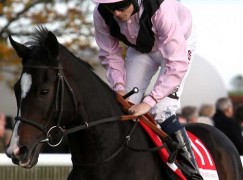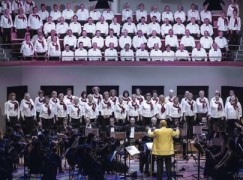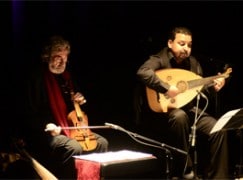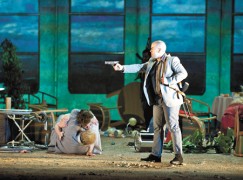
Meet Wigmore Hall, named after London’s premier chamber music venue. It’s running next month at Sandown.
Worth a bet.

Meet Wigmore Hall, named after London’s premier chamber music venue. It’s running next month at Sandown.
Worth a bet.
While researching my BBC series on Music and the Jews, I discovered in the National Sound Library in Jerusalem a series of recordings cut by an ethnomusicologist in the 1930s onto the surface of discarded hospital x-rays. The emergency solution had been devised by Robert Lachman, frustrated by a German ban on exporting shellac to Jews in Palestine. The x-rays still play perfectly when placed on a turntable.
Now I hear that the same method was used by rebels in the Soviet Union in the 1950s to duplicate and disseminate forbidden western recordings by Elvis Presley, Duke Ellington and more. Every x-ray was a potential samizdat record. See them here.

We know, doesn’t sound promising.
But our pair of New York opera ingenues, Elizabeth Frayer and Shawn Milnes, fearing a long Metropolitan Opera shutdown, betook themselves to Madam Tussauds to see Rameau’s Pygmalion (hands up if you’ve ever seen it before). One way or other, they had a pretty good time.
Read here.

A few hours ago we reported concern among classical artist agents that a rogue website was stealing their data. No longer. Exposed to the light of day, the parasites simply disappeared.
How do we know? One of the agents mailed to say thanks.
The Swedish director Folke Abenius died yesterday, aged 80. He was head of the Royal Theatre in Stockholm, 1978-84, and staged many long-lasting productions of staple operas in Drottningholm, Oslo, Helsinki, Copenhagen and Hamburg.
His 1972 Rosenkavalier played unchanged in Stockholm for 37 years.

Doctors had given up on Barry Todd, who nearly died of an aneurysm and had been ten days in a coma. But his wife Carol played CDs of his Midland Voices choir in rehearsal and Barry, 64, somehow came around.
Read here.

The uniquely cross-cultural Jordi Savall is peforming at the Fes Festival of Sacred World Music. Exclusive video and report for slippedisc.com.
Report by Chris Gilchrist, video by Lynn Evans Davidson.

Dar Batha, Fes 17 June 2014 Chris Gilchrist
For the past decade, early music maestro Jordi Savall has been excavating the common musical language of mediaeval Europe and the Middle East. His ‘big band’ Hyperion has played at the Fes Festival of World Sacred Music before, but on this occasion his ensemble consisted of himself on viol and rubab, Driss all Maloumi on oud (lute), Hakan Gungor on kanoon (dulcimer) and Houcin Baqir (percussion).
There can be few better settings for a small group of early music players than Dar Batha. The audience, twenty to fifty feet from the stage in a courtyard under a giant Barbary oak, could catch the nuances of every phrase thrown lightly back and forth between the instruments in a virtuoso rendition of roots medieval.
Savall’s contention is that many of the common tunes found across the Mediterranean originated as sacred chants and morphed as they travelled into laments, dances, romantic songs and lullabies. Those familiar with the Cantigas de Santa Maria heard versions in which the shimmer of the kanoon underpinned a Middle Eastern inflection that sounded entirely authentic.
Oud player Driss all Maloumi probably opened many ears to the virtues of his instrument. His delicacy of touch and phrasing were delightful and he moved seamlessly from a Western lute style to a Middle Eastern one. His soft, fluent voice would have been lost in a large hall, but at the Batha he brought out the poignancy of the lament, whether from Moldova, Armenia or Syria.
The ensemble took the tunes and moved the dial from West to East. One sounded like a troubadour song, while several others emphasised the repeated five-note phrases typical of the Middle East- and says Savall, of all mediaeval Europe in the era before modulation. Some tunes started with the earthy notes of the rubab, an early viol cut from a single block of wood, before lifting into the middle ranges of the oud and the higher registers of the kanoon. Others reversed the sequence, the viol taking the melodic lead and all three instruments together created a surprisingly balanced harmony.
Savall is as much scholar as musician, having traced individual tunes through more than fifteen countries. Versions of many are played today, a contemporary Berber lullaby for example, is the distant descendant of a melody that may have originated in Syria over a thousand years ago.
By demonstrating the commonality of Middle Eastern and European music in the medieval period, Savall has opened a channel to the appreciation of Middle Eastern genres that can seem alien to a modern Western ear. In medieval Europe it seems that we were all singing from the same hymn sheet.
The juryretired shortly after noon to consider its verdict.
We may know by nightfall if the Australian musician and entertainer was, or was not, a serial sex offender.

And whether anyone at the BBC covered for him.
May sound? The Australian composer and chorus director Gordon Hamilton believes we always sound better when singing in the shower, and goes on to explain why. Read here. I’ve always wanted to know why….

We’ve received this warning from a niche European agency:
We agents are somewhat baffled by a rogue website which has, without permission, incorporated information about various agencies and their artists, mostly incomplete and incorrectly spelled.
The European Association of Artists Agents has put it on its forum for discussion. This website is available in numerous languages – I checked the German, which is lousy, the French looks like a Google translation
We won’t name the website, for obvious reasons, but you may need to watch out.
Outcome? Result here.
The headline on the BBC story linked here is wilfully misleading.
The Met did not cancel ‘anti-semtic’ broadcast. To suggest that it did is a defamation of John Adams, Alice Goodman and everybody else who is and was involved with the making of The Death of Klinghoffer. The Met, as most outlets faithfully reported, cancelled the simulcast out of fear that it might be perceived in some quarters to be anti-semitic.
The issue here is the standard of BBC website reporting, which ranges from poor to appalling.
If you have a moment, complain to the DG, Tony Hall. This is really bad news.

We gave you the stunning low, low version yesterday.
Here’s the beauty of high altitudes from South African flautist Wouter Kelleman.
